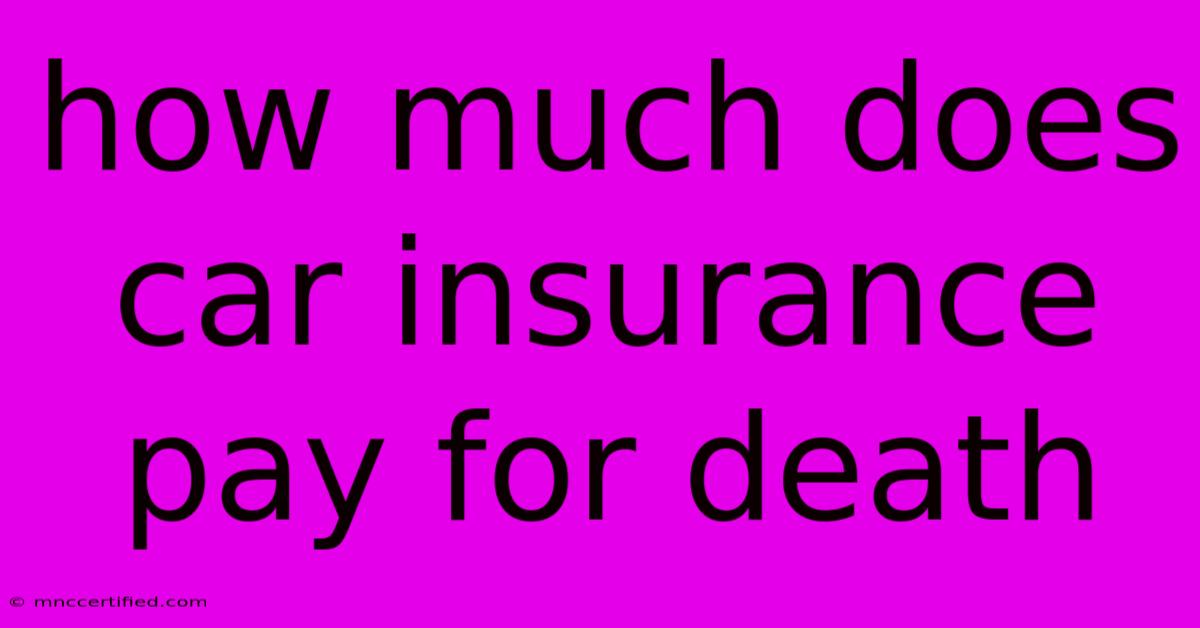How Much Does Car Insurance Pay For Death

Table of Contents
How Much Does Car Insurance Pay for Death? Understanding Your Coverage
The thought of a loved one's death due to a car accident is a painful one. And while no amount of money can truly compensate for such a loss, understanding your car insurance coverage for death is crucial.
What is Death Benefit Coverage?
Car insurance doesn't directly pay for death. Instead, it provides death benefits through specific coverages like "Uninsured/Underinsured Motorist (UM/UIM) Coverage" and "Personal Injury Protection (PIP)". These coverages typically offer financial support to surviving family members in case of:
- Fatality: A person's death resulting from a car accident.
- Other Injuries: Severe injuries that lead to long-term care or death.
How Much Can You Expect?
The amount you receive depends on several factors:
- Type of Coverage: Each state and insurance company has different regulations and policies regarding death benefits.
- Policy Limits: Your individual policy will have limits on the maximum payout for death benefits.
- Circumstances of the Accident: Whether the accident involves an uninsured/underinsured driver or not will influence the payout.
Breaking Down the Coverages
Let's take a closer look at how these specific coverages work:
Uninsured/Underinsured Motorist (UM/UIM) Coverage
- Purpose: UM/UIM coverage protects you if you are involved in an accident with a driver who doesn't have adequate insurance or is uninsured.
- Payout: It covers medical expenses, lost wages, and death benefits to survivors.
- Importance: This coverage is crucial, especially in states with a high number of uninsured drivers.
Personal Injury Protection (PIP)
- Purpose: PIP coverage provides benefits to you and your passengers, regardless of who caused the accident.
- Payout: Covers medical expenses, lost wages, and death benefits for eligible individuals.
- Availability: Not all states require PIP coverage, and the specific benefits offered may vary.
Key Considerations
- State Laws: Insurance regulations vary significantly from state to state. Check with your state's Department of Insurance for specific requirements.
- Policy Review: Regularly review your insurance policy to ensure you have sufficient coverage.
- Consult an Insurance Agent: An experienced insurance agent can help you understand your coverage and tailor it to your needs.
Important Note: While car insurance can offer financial assistance in the event of a death, it's crucial to remember that the most valuable asset is peace of mind provided by adequate coverage. Choose a policy that provides comprehensive protection for you and your loved ones.

Thank you for visiting our website wich cover about How Much Does Car Insurance Pay For Death. We hope the information provided has been useful to you. Feel free to contact us if you have any questions or need further assistance. See you next time and dont miss to bookmark.
Featured Posts
-
Trumps Impact On Elon Musks Business
Nov 07, 2024
-
Free Nba Stream Warriors Vs Celtics Today
Nov 07, 2024
-
Trump Takes Walzs Home County In Election
Nov 07, 2024
-
Few Bottled In Bond Single Barrel Whiskey
Nov 07, 2024
-
Special Construction Motorcycle Insurance
Nov 07, 2024